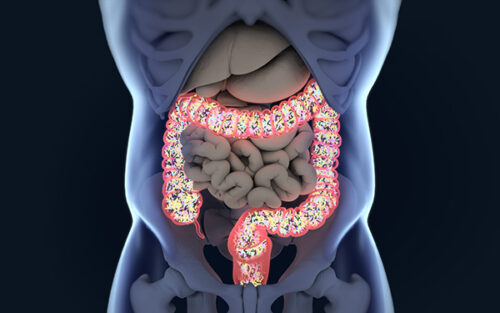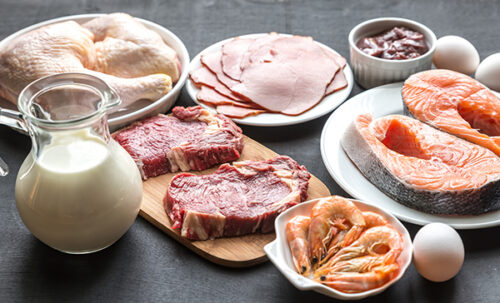Dr. McDougall's Comments on the National Headline About the March 18, 2014 Annals of Internal Medicine Article Suggesting Saturated Fat (Dairy, Meat, and Eggs) Is OK to Eat
[frame src=”https://www.drmcdougall.com/wp/wp-content/uploads/Fatty-foods.jpg” width=”IMAGE_WIDTH” height=”IMAGE_HEIGHT” lightbox=”off” title=”Dr. McDougall’s Comments on the National Headline About the March 18, 2014 Annals of Internal Medicine Article Suggesting Saturated Fat (Dairy, Meat, and Eggs) Is OK to Eat” align=”right” ]
1) I agree with the conclusion that polyunsaturated fats (fish oil) and monounsaturated fat (olive oil) are not going to prevent heart disease. They are at least fattening and most likely promote cancer.
2) However, I know that one of their main conclusions is wrong: That it is OK to eat animals. Dairy, meat, and eggs are bad for people and the planet.
This March 18, 2014 Annals of Internal Medicine article will become a feeding frenzy for the animal-food-industries: a “nugget of proof” that their saturated fat-laden foods can be eaten guiltlessly. Millions of people worldwide, especially those who are looking to hear good news about their bad habits, will die of heart disease, diabetes, cancer, and obesity, and if left unchallenged, resulting increases in livestock production will accelerate global warming even faster.
Please read on if you are interested in the details:
1) The main scientific study they used showing the safety of saturated fat (reference 12), was a study supported by the National Dairy Council. (Siri-Tarino PW, Sun Q, Hu FB, Krauss RM. Meta-analysis of prospective cohort studies evaluating the association of saturated fat with cardiovascular dis ease. Am J Clin Nutr. 2010;91:535-46.) This is the single study used to promote eating animals by the low-carb movement and the animal food industries.
Jeremiah Stamler, MD wrote an editorial in this same issue of the American Journal of Clinical Nutrition criticizing this flawed paper that has received so much attention in the lay press.
Letters to the editor that followed were also highly critical of this advertisement for meat and dairy (saturated fat).
2) In the results section of the Annals of Internal Medicine (March 18, 2014) article they wrote: “Seventy-two unique studies were identified (Figure 1 of Supplement 1 and the Table). Nineteen were based in North America, 42 in Europe, and 9 in the Asia-Pacific region; 2 were multinational.”
I would like to look at the 9 in the Asia-Pacific region and the 2 that were multinational, independently. This would show the effect of different diets on health (and coronary heart disease).
In the nineteen that were based in North America and 42 in Europe, people all ate the same diet (full of saturated fat, ie. Dairy, meat, and eggs) – how could you possibly see any difference in health?
3) This is an incorrect statement in the discussion of the Annals of Internal Medicine (March 18, 2014) paper:
“For example, the influence of metabolism seems particularly relevant for the de novo synthesis of even-numbered saturated fatty acids in the body, compositions of which are largely determined by dietary factors, including carbohydrate and alcohol consumption (33–35), and other metabolic pathways (36, 37) rather than direct dietary intake.”
Excess Starch (and even Sugar) Does Not Turn to Body Fat (Easily)
(From: https://www.drmcdougall.com/misc/2009nl/mar/passionate.htm)
A widely held belief is that the sugars in starches are readily converted into fat and then stored unattractively in the abdomen, hips, and buttock. Incorrect! And there is no disagreement about the truth among scientists or their published scientific research.5-13 After eating, the complex carbohydrates found in starches, such as rice, are digested into simple sugars in the intestine and then absorbed into the bloodstream where they are transported to trillions of cells in the body in order to provide for energy. Carbohydrates (sugars) consumed in excess of the body’s daily needs can be stored (invisibly) as glycogen in the muscles and liver. The total storage capacity for glycogen is about two pounds. Carbohydrates consumed in excess of our need and beyond our limited storage capacity are not readily stored as body fat. Instead, these excess carbohydrate calories are burned off as heat (a process known as facultative dietary thermogenesis) or used in physical movements not associated with exercise.9,13
The process of turning sugars into fats is known as de novo lipogenesis. Some animals, such as pigs and cows, can efficiently convert the low-energy, inexpensive carbohydrates found in grains and grasses into calorie-dense fats.5 This metabolic efficiency makes pigs and cows ideal “food animals.” Bees also perform de novo lipogenesis; converting honey (simple carbohydrates) into wax (fats). However, human beings are very inefficient at this process and as a result de novo lipogenesis does not occur under usual living conditions in people.5-13 When, during extreme conditions, de novo lipogenesis does occur the metabolic cost is about 30% of the calories consumed—a very wasteful process.11
Under experimental laboratory conditions overfeeding of large amounts of simple sugars to subjects will result in a little bit of de novo lipogenesis. For example, trim and obese women were overfed 50% more total calories than they usually ate in a day, along with an extra 3.5 ounces (135 grams) of refined sugar. From this overfeeding the women produced less than 4 grams (36 calories) of fat daily, which means a person would have to be overfed by this amount of extra calories and sugar every day for nearly 4 months in order to gain one extra pound of body fat.10 Obviously, even overeating substantial quantities of refined and processed carbohydrates is a relatively unimportant source of body fat. So where does all that belly fat come from? The fat you eat is the fat you wear.
5) Hellerstein MK. De novo lipogenesis in humans: metabolic and regulatory aspects.Eur J Clin Nutr. 1999 Apr;53 Suppl 1:S53-65.
6) Acheson KJ, Schutz Y, Bessard T, Anantharaman K, Flatt JP, Jequier E. Glycogen storage capacity and de novo lipogenesis during massive carbohydrate overfeeding in man. Am J Clin Nutr. 1988 Aug;48(2):240-7.
7) Minehira K, Bettschart V, Vidal H, Vega N, Di Vetta V, Rey V, Schneiter P, Tappy L. Effect of carbohydrate overfeeding on whole body and adipose tissue metabolism in humans. Obes Res. 2003 Sep;11(9):1096-103.
8) McDevitt RM, Bott SJ, Harding M, Coward WA, Bluck LJ, Prentice AM. De novo lipogenesis during controlled overfeeding with sucrose or glucose in lean and obese women. Am J Clin Nutr. 2001 Dec;74(6):737-46
9) Dirlewanger M, di Vetta V, Guenat E, Battilana P, Seematter G, Schneiter P, JÇquier E, Tappy L. Effects of short-term carbohydrate or fat overfeeding on energy expenditure and plasma leptin concentrations in healthy female subjects. Int J Obes Relat Metab Disord. 2000 Nov;24(11):1413-8.)
10) McDevitt RM, Bott SJ, Harding M, Coward WA, Bluck LJ, Prentice AM. De novo lipogenesis during controlled overfeeding with sucrose or glucose in lean and obese women. Am J Clin Nutr. 2001 Dec;74(6):737-46
11) Danforth E Jr. Diet and obesity. Am J Clin Nutr. 1985 May;41(5 Suppl):1132-45.
12) Hellerstein MK. No common energy currency: de novo lipogenesis as the road less traveled. Am J Clin Nutr. 2001 Dec;74(6):707-8.
13) Tappy L. Metabolic consequences of overfeeding in humans. Curr Opin Clin Nutr Metab Care. 2004 Nov;7(6):623-8.
Recommended Articles

Vitamin B12 Deficiency—the Meat-eaters Last Stand

How to Achieve and Maintain a Healthy Gut Microbiome





